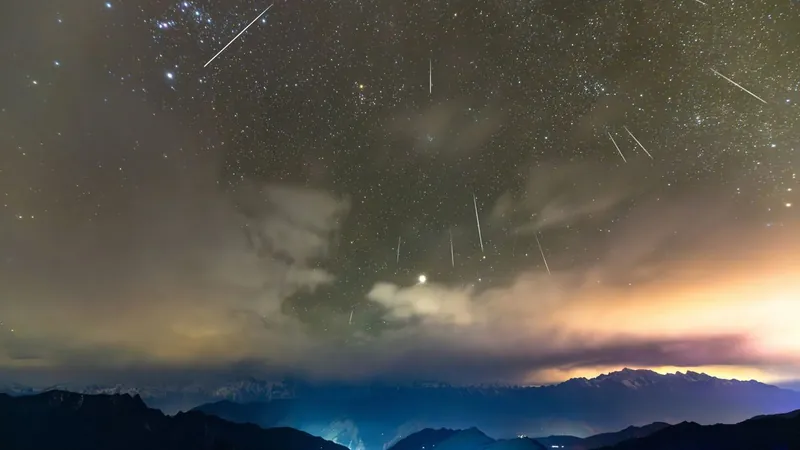
The Geminid Meteor Shower Is Here: How to Make the Most of Your Viewing Experience!
2024-12-09
Author: Emily
The Geminid Meteor Shower Is Here
The Geminid meteor shower, renowned as one of the most spectacular celestial events of the year, is ready to light up the night sky this week. Skywatchers can expect an impressive display, with up to 120 meteors per hour visible under optimal conditions when the shower peaks on the night of December 13-14.
However, this year's experience may be slightly hampered by an almost full moon, which will cast light across the sky, potentially obscuring fainter meteors. Despite this hindrance, eager viewers can still catch glimpses of the larger, more vibrant meteors that the Geminids are known for. If the weather permits clear skies, make sure to head outside and soak in this breathtaking display of nature.
What Causes the Geminid Meteor Shower?
The Geminid meteor shower is unique because it originates from debris from an unusual near-Earth asteroid named 3200 Phaethon. This asteroid behaves like a comet and completes its orbit around the sun approximately every 1.4 years. It's believed that thousands of years ago, 3200 Phaethon might have collided with another celestial body, releasing a stream of particles that Earth encounters annually, thereby creating the Geminid meteor shower.
Tips for Viewing the Geminids
Typically, Geminid meteors are easy to spot. They radiate from the constellation Gemini, which will be ideally positioned in the northern hemisphere sky around 10 p.m. local time. To maximize your chances of seeing these shooting stars, it's advisable to find a dark location, face away from the bright moon, and look towards the darker areas of the sky.
As you prepare for the meteor shower, dress warmly and consider bringing a hot beverage to make your viewing experience more enjoyable. Give your eyes time to adjust to the darkness; with a bit of patience and luck, you could witness one of the year's most impressive celestial shows.
What If I Miss the Peak?
If weather conditions don’t allow you to catch the peak overnight, don’t fret! The Geminid meteor shower will remain active until approximately December 24, providing ample opportunities for you to marvel at the last major meteor shower of the year.
Conclusion
So grab your friends, head outdoors, and enjoy the cosmic fireworks display that awaits you. Happy stargazing!









 Brasil (PT)
Brasil (PT)
 Canada (EN)
Canada (EN)
 Chile (ES)
Chile (ES)
 España (ES)
España (ES)
 France (FR)
France (FR)
 Hong Kong (EN)
Hong Kong (EN)
 Italia (IT)
Italia (IT)
 日本 (JA)
日本 (JA)
 Magyarország (HU)
Magyarország (HU)
 Norge (NO)
Norge (NO)
 Polska (PL)
Polska (PL)
 Schweiz (DE)
Schweiz (DE)
 Singapore (EN)
Singapore (EN)
 Sverige (SV)
Sverige (SV)
 Suomi (FI)
Suomi (FI)
 Türkiye (TR)
Türkiye (TR)